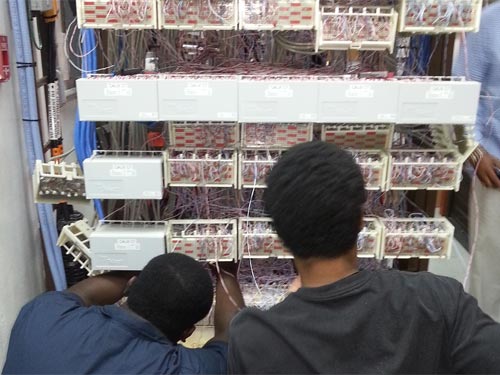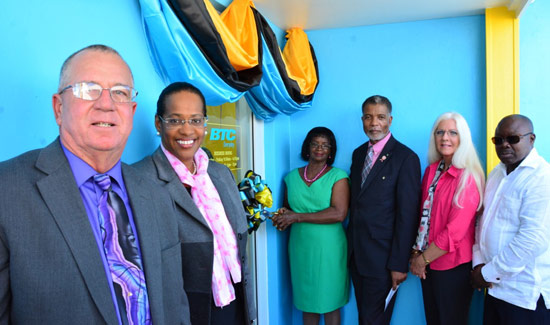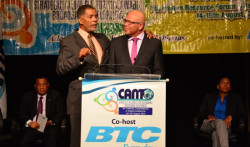
Fresh off the heels of a $40+ million investment that netted an 800% increase in data usage following transformation of its mobile network, BTC’s CEO said the telecom company is spending another $60+ million to upgrade landline service in a bid to win loyalty from business and residential users and to create the nation’s fastest internet service.
With a fully competitive environment closing in, BTC is pulling out all the stops -pushing the largest investment ever in the history of telecommunications in The Bahamas. And, as each section is completed, the company is deploying door-to-door sales forces to inform customers and demonstrate improved landline and faster internet service. Teams are focusing on businesses and in both commercial and residential cases, completing standard internet and phone installations in one day that used to take up to a week.
Addressing more than 120 business and civic leaders at the 9th Annual Abaco Business Outlook September 26, BTC CEO Geoff Houston revealed that inspiration for the sales campaign following upgrades was the “overwhelming positive response” to an improved cellular platform.
“What we saw when we upgraded our mobile offerings was an almost insatiable appetite among Bahamians for the latest devices, the fastest downloads, the newest, the best,” said Houston. “When we launched 4G (the fastest download speeds available worldwide) mobile voice traffic increased by 60%. Mobile data was up by 800%. Before we upgraded, 3% of our sales were smart phones. Today nearly half of all our phone sales are smart phones.”
Using that as a benchmark, Houston said that while the company would continue to focus attention on mobile offerings, employing the first Long Term Evolution license in the country allowing it to deliver 4G up to 10 times faster, it would invest multi-millions to create “the fastest internet in the region.”
“Six months ago, we were accessing the internet with two gigabits of capacity and we were doing that through a link to Miami,” said Houston. “It was like trying to suck an elephant through a straw.
“Today we are investing more than $60 million to build an infrastructure that will enable long-term development and handle growing demand because the interesting thing is the faster the speed we provide, the more demand there is. The Next Generation Network will increase speed by as much as four times and when we are done, there will be real competition in the internet market and we in The Bahamas will have the fastest Next Generation Network in the entire region.”
According to Houston, the massive infrastructural project is employing some 50 construction and technical workers at various sites, moving between islands. Among the tasks — replacing 20 year-old radio systems and in some cases, 50-year-old underground cable.
“What we are doing is accomplishing in 18 months what under normal circumstances would take four to five years to complete,” Houston said. “When we are done, customers will enjoy a better overall experience with internet and landline service.”
The work includes excavation, ripping out old, antiquated massive cables and replacing them with fibre optic. On more than 50 occasions, work has been disrupted by heavy equipment connected with the road works project tearing up underground cable, causing crews to be diverted for rebuilding infrastructure and reconnecting service, sometimes to thousands.
BTC’s Vice President of Field Operations Carl Culmer, responsible for the construction, outlined progress of the transformation on an island-by-island basis.
Work in Long Island is in close to completion, he said, with the last settlements between Clarence Town, Hamilton and Deadman’s Cay being connected to fibre optic cable.
San Salvador is nearly complete with only stretches between Sandy Point and Cockburn Town and Cockburn Town and United Estates awaiting fibre optic cable. Teams are on the ground and work is slated for completion by month end.
Andros, too, is nearing completion and crews there hope to finish by the end of next week. In Abaco, work was completed in Man ‘o War Cay and Hopetown in March. “Before we replaced the old radio systems, every time it rained, you’d lose service.”
Work continues as well in pockets of New Providence. Only Acklins presents a challenge, said Culmer, because no provision was made for a fibre optic cable connection.
“It’s exciting to see all the work going on and to be part of it,” said the man who has spent 32 years with BTC and been at the forefront of field operations for decades. “My team has a whole new energy. Some of them have to leave their families behind in Nassau for weeks at a time but they have a great spirit and great attitude and the competition is fierce to get the job done and to keep everything up and running. It’s really exciting times.”
Field Operations Senior Manager Kenyon Basden has had to balance completing installations with constant repairs, many as a result of accidents related to the New Provide Road Works Project. But, he said, the new fibre optic cables would simplify future repairs.
“With the replacement of copper cables with fiber optic cables, a repair that would have taken days to complete will now take just a few hours and less men to accomplish,” Basden said. “Many times, disruptions in service are caused by damaged wire lines and repair often takes a great amount of labor and time to resolve at a great cost to the company. So the team is efficiently working on eliminating the amount of copper wire used and replacing it with fiber optic cable to decrease cost and time.”
BTC is also placing more access points around the country to ensure that customers have a faster internet experience. Customers with a $29.99 internet package will have their internet speeds quadrupled to 4mg with no increase in cost. Users who are more inclined to stream movies and download video games might be interested in an 8mg package for an additional $10.00. For more information, visit: www.btcbahamas.com
By Diane Phillips & Associates
Caption: BTC Continues Investment in Infrastructure – BTC technicians hard at work making upgrades to the Next Generation Network, which when complete, will increase internet speeds by as much as four times.



